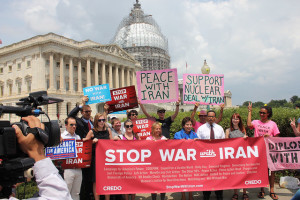
Demonstration against war with Iran, U.S. Capitol
President Barack Obama is undertaking an intense effort to sell his deal to prevent Iran from developing nuclear weapons. On Tuesday, White House officials reached out to progressive voters on a joint conference call with Keystone Progress, which is “Pennsylvania’s largest online progressive action network.” Keystone’s executive director, Michael Morrill, was on the call, as well as Mary Kaszynski, the Communications Manager for Ploughshares Fund, which supports efforts to eliminate nuclear weapons and threats. They were joined by John Bisognano, the White House Associate Director of Public Engagement, and Marie Harf, Senior Advisor to Secretary of State John Kerry.
Marie Harf said that she has been part of the Iran deal negotiating team since 2013. She said that the U.S. goals are to (a) cut off all four pathways for Iran to acquire a nuclear weapon, and (b) to extend the breakout time for Iran to be able to develop a nuclear weapon from the current minimum estimate of only 90 days, to a period of 10 years or more. Harf addressed several criticisms of the Iran deal. She emphasized that the deal is not about the U.S. trusting Iran. Rather, according to Harf, it is about verifiable steps to prevent the development of weapons, and close checking for cheating by Iran. Harf said that the U.S. is choosing diplomacy over conflict, which is the only other option. She said that conflict in the Middle East is a bad choice, which costs the U.S. in lives and treasure and still doesn’t prevent Iran from developing nuclear weapons. Harf also stressed that, despite lies from critics, the deal prevents Iran from developing nuclear weapons forever.
In response to questions from participants on the call, Harf stated that many scientists, including Nobel laureates, say that this is the most stringent anti-nuclear deal ever, and is even supported by hawkish Republicans such as Brent Scowcroft, the National Security Adviser to Presidents Gerald Ford and George H.W. Bush.
Likewise, John Bisognano said that the 24 day waiting period before inspections that critics have latched onto is not a real threat. He said that it is relatively easy to find fissile material like enriched uranium or plutonium because, with a half life of 60 years in the human body and 4 billion years in the ground, such material is impossible to hide. Marie Harf added that the U.S. has 24/7 access to known sites, and that we will now have access to inspect other sites which we have been prohibited from inspecting for decades.
Harf added that the “P5+1” countries that are involved in the Iran deal (United Kingdom, Germany, France, China, Russia, European Union) largely support the deal, and that America would be isolated and weakened if we did not sign on. Harf stressed that none of these countries has any illusions about Iran’s behavior, such as its support of terrorism, but that the deal is beneficial regardless of Iran’s behavior, and is even more necessary with a bad regime than a good one. Bisognano stated that the U.S. does not want to repeat the Iraq War in Iran.
Harf also said that, despite some reports to the contrary, the deal does not outsource inspection to Iran. Rather, the International Atomic Energy Agency (IAEA) has an ongoing investigation regarding one location, Parchin, and is working with Iran to obtain the necessary information to complete the investigation. Addressing another concern, Harf stated that, if Iran is found to be cheating on the deal, the U.S. can unilaterally reimpose sanctions on Iran immediately.
Bisognano and Harf then left the call to avoid conflicts regarding White House joint lobbying on the Iran deal. Mike Morrill of Keystone Progress talked about the upcoming Iran deal vote in the U.S. Senate. Morrill said that there were 27 Senators on record in favor of the deal thus far. He said that 33 votes would be needed to uphold a presidential veto of a Senate vote disapproving the deal, and that 40 votes would prevent the Senate from disapproving the deal in the first place. According to Morrill, Pennsylvania Republican Senator Pat Toomey has opposed the deal, while Democratic Senator Robert Casey has not yet stated his position. Morrill indicated that supporters need to push Casey and other Senators to favor the deal, by calling their offices (he said calls to home-state Senators are most effective). Additionally, Morrill said that many people were participating in yesterday’s Action Day on Iran, which includes groups such as Credo Mobile and Daily Kos. Finally, Morrill encouraged supporters to join online actions, such as emails and petitions, by groups such as MoveOn.org and Democracy For America.
Obviously, the proposed deal with Iran is complicated, and most people will not have the time, ability or inclination to read the deal. They will be relying on others to tell them whether this is a good, strong deal or not. Outreach efforts such as this conference call from the White House demonstrate that the Obama administration is not afraid to answer critics, and provide facts that they say support the deal’s approval.
Photo by Ben Wikler, used under Creative Commons license. http://is.gd/Wm4TdN


